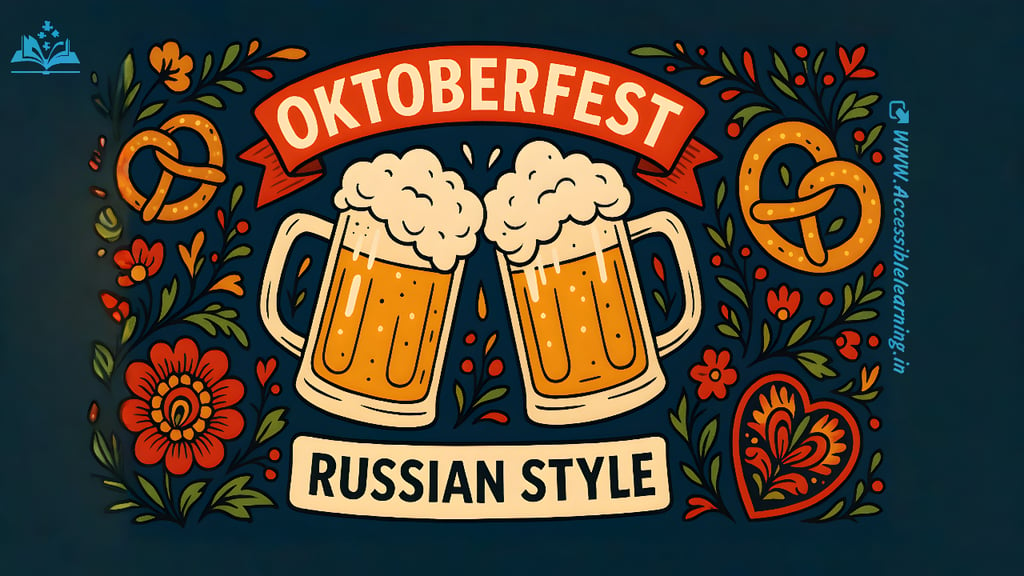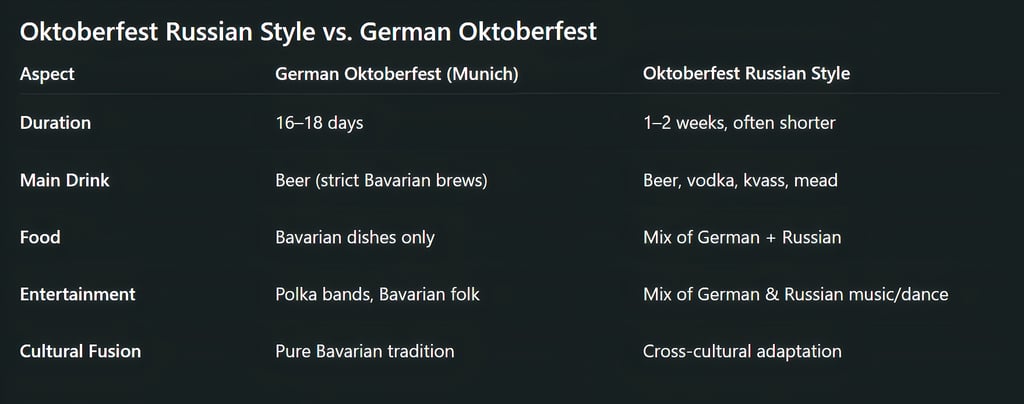
Oktoberfest Russian Style: How Germany’s Beer Festival Found a Home in Russia
Discover Oktoberfest Russian Style—a unique blend of Bavarian tradition and Russian culture. Explore the food, beer, music, costumes, and celebrations in Moscow, St. Petersburg, and beyond. Perfect for travelers and culture lovers.
EVENT/SPECIALTRAVEL LIFESTORY/ENTERTAINMENTRUSSIACELEBRATION/FESTIVALS
Kim Shin
10/4/20254 min read


When most people think of Oktoberfest, the bustling streets of Munich, giant beer tents, and Bavarian folk music come to mind. But in recent years, a fascinating cultural twist has emerged: Oktoberfest Russian Style. Russia, with its deep appreciation for social gatherings, hearty food, and strong drinks, has reimagined this German tradition in its own way—merging Bavarian festivity with Russian soul.
In this article, we’ll explore the origins, cultural adaptations, food, drinks, entertainment, and significance of Oktoberfest in Russia, along with why it has become a popular event for locals and travelers alike.
Origins: How Oktoberfest Came to Russia
The original Oktoberfest dates back to 1810 in Munich, Germany, celebrating the royal wedding of Crown Prince Ludwig. Over time, it evolved into the world’s largest folk festival, celebrated globally.
Russia, with its long history of cultural exchange with Europe, embraced this event in the late 20th century. The growth of German breweries, expat communities, and international cultural events helped Oktoberfest make its way into Russian cities like Moscow, St. Petersburg, and Kazan. What started as niche gatherings soon became large-scale festivals attracting thousands of visitors.
Oktoberfest Russian Style: Key Characteristics
Unlike Munich’s Oktoberfest, which is steeped in Bavarian traditions, Russia’s version blends authentic German customs with Russian cultural flair:
1. Beer with a Russian Twist
Authentic German breweries such as Paulaner and Spaten participate in Russia’s Oktoberfest.
Local Russian breweries also contribute, offering classic lagers, wheat beers, and craft brews alongside traditional Russian drinks like kvass and honey-based mead.
Stronger spirits, such as vodka, are often available, reflecting Russia’s own drinking traditions.
2. Food Fusion
German classics like pretzels, bratwursts, schnitzels, and sauerkraut are served.
Russian cuisine sneaks in with pirozhki (stuffed buns), shashlik (grilled skewers), pelmeni (dumplings), and hearty rye bread.
The combination creates a cross-cultural feast where Bavarian comfort food meets Russian flavors.
3. Costumes and Dress Codes
Traditional dirndls and lederhosen are popular, especially in themed restaurants and beer halls.
Some participants mix these with Russian folk attire, creating a unique visual blend of cultures.
4. Entertainment and Music
Bavarian folk music, accordion tunes, and German polkas are performed alongside Russian folk dances, balalaika music, and contemporary bands.
Events often include beer-drinking contests, traditional dances, parades, and games adapted to Russian humor and style.
Where to Celebrate Oktoberfest in Russia
Oktoberfest celebrations take place in major Russian cities, usually from late September to early October:
Moscow: The largest celebrations occur in beer halls and cultural centers, featuring both German and Russian brewers.
St. Petersburg: Known for its European flair, the city hosts grand Oktoberfest events in restaurants, pubs, and outdoor squares.
Kazan, Sochi, and Yekaterinburg: Regional cities embrace the festival with local adaptations, combining German tradition with Tatar or Caucasian flavors.
Hotels, restaurants, and breweries organize multi-day events, often decorated with Bavarian colors—blue and white—with Russian hospitality at the forefront.
Why Russians Love Oktoberfest
Cultural Exchange—Oktoberfest offers Russians the chance to experience Bavarian traditions without leaving the country.
Love for Social Gatherings—Russians value warmth, friendship, and toasts; Oktoberfest fits perfectly with this communal spirit.
Food and Drink Celebration—With hearty meals and strong drinks, the event matches Russian tastes for indulgence.
Festive Atmosphere—Lively music, costumes, and games make Oktoberfest Russian Style more than just a drinking event—it’s a cultural festival.



Human-Centered Perspective: More Than Just Beer
What makes Oktoberfest Russian Style truly special is its human element. Beyond the beer mugs and hearty food, it reflects how cultures interact and evolve. For Germans in Russia, it’s a taste of home. For Russians, it’s an opportunity to explore a global tradition while adding their own flavor. For tourists, it’s a unique chance to witness Bavarian cheer through a Russian lens.
This cultural celebration demonstrates that festivals are not static—they adapt, evolve, and resonate differently depending on the people celebrating them.
Oktoberfest Russian Style is more than just an imported tradition—it’s a celebration of cultural blending, hospitality, and joy. Whether you’re enjoying Bavarian beer in Moscow, tasting shashlik next to a German bratwurst, or dancing to both polkas and Russian folk songs, you’ll feel the shared spirit of togetherness.
So if you can’t make it to Munich, consider Russia’s take on Oktoberfest. You’ll discover a festive mix of beer, culture, and community—all with a unique Russian soul.
Frequently Asked Questions
Q. What is Oktoberfest Russian Style?
Oktoberfest Russian Style is Russia’s adaptation of the German Oktoberfest festival. It combines Bavarian traditions—beer, pretzels, and folk music—with Russian culture, including local foods, vodka, and folk entertainment.
Q. Where is Oktoberfest celebrated in Russia?
The biggest celebrations are held in Moscow and St. Petersburg, but the festival also takes place in regional cities like Kazan, Sochi, and Yekaterinburg. Restaurants, breweries, and cultural centers usually host the events.
Q. Do Russians celebrate Oktoberfest the same way as Germans?
Not exactly. While the German Oktoberfest focuses on Bavarian beer, costumes, and food, Russia’s version adds a local twist with Russian dishes, vodka, kvass, and folk performances.
Q. Can tourists attend Oktoberfest in Russia?
Yes, tourists are welcome. Oktoberfest events in Russia are designed for locals and international visitors, offering a great opportunity to experience a mix of cultures in one festival.
Q. What do people wear at Oktoberfest Russian Style?
Many wear traditional Bavarian outfits like lederhosen and dirndls, while others mix them with Russian folk costumes, creating a colorful and diverse atmosphere.
Q. What kind of drinks are served at Oktoberfest in Russia?
You’ll find German beers (Paulaner, Spaten, and Hofbräu), Russian craft beers, traditional kvass, mead, and sometimes vodka, reflecting Russia’s beverage culture.
Q. When does Oktoberfest take place in Russia?
Just like in Germany, it usually happens from late September to early October, though the duration may be shorter—typically a week or two.
Subscribe To Our Newsletter
All © Copyright reserved by Accessible-Learning Hub
| Terms & Conditions
Knowledge is power. Learn with Us. 📚


